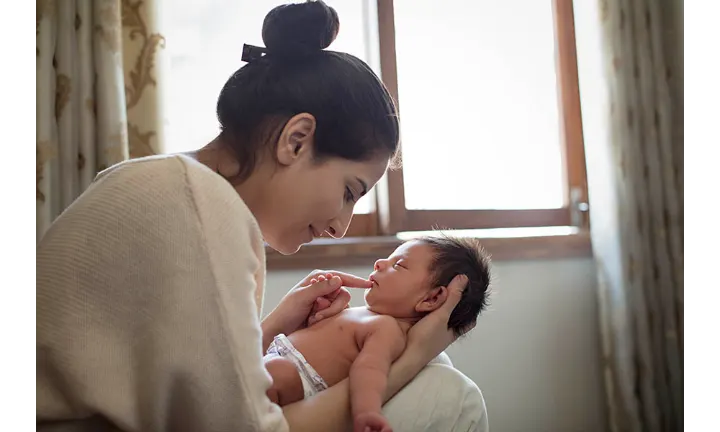Everything You Need to Know About Postpartum Hair Loss!
Hey, new mom! Your body has gone through multiple changes during pregnancy and childbirth. But did you know, post-pregnancy there are some additional changes that occur in your body? An excessive, sudden hair fall is one of them. It is known as postpartum hair loss, which is a common symptom faced by many women post-pregnancy. But worry not! The good news is that hair fall after pregnancy is only temporary.
Read on to know how long postpartum hair loss lasts, what exactly causes it and which postpartum hair loss remedy you can use after childbirth.
What Is Postpartum Hair Loss?
Many women experience some hair loss after giving birth. You might find that your hair seems a little thinner all over your head, or you might notice that you’re ‘shedding’ a little more than usual when you run your fingers through your hair or when you wash your hair, for example.
Although you may feel worried about it, remember that this kind of hair loss is common during the postpartum period and is usually temporary. As the effects of pregnancy-related hormonal changes on your body slowly subside, your hair will return to normal – in other words, return to what it was before you were pregnant.
What Causes Hair Loss After Giving Birth to Your Baby?
Pregnancy hormones can affect your body in several different ways. You may have noticed, for example, that your hair became thicker when you were pregnant. The hormone oestrogen was responsible for this, making your hair grow faster and less likely to fall out.
However, after giving birth to your little one, you may find that all that extra hair you gained during your pregnancy now starts to come loose and shed. This is why you may experience postpartum hair loss in the first few months after your baby is born.
Essentially, the surplus hair that grew (or didn’t fall out) during pregnancy is now falling out. In a way, although it may seem like hair ‘loss’, it’s actually just things returning to as they were before you were pregnant.
By the way, these same pregnancy hormones may also mean that you find your hair is oilier or drier than usual or even has a slightly different colour and texture during pregnancy and afterwards.
When Does the Postpartum Hair Loss Start?
A woman can start experiencing postpartum hair loss, typically in just a few months post-childbirth.
How Long Does Postpartum Hair Loss Last?
Precisely how long it takes the body to recover after childbirth can differ from person to person. Generally speaking, postpartum hair loss stops after around three to six months.
How Can You Stop or Prevent Postpartum Hair Loss?
If the hair loss you’re experiencing is caused by the hormonal changes associated with pregnancy and childbirth, it may simply stop on its own without any treatment at all.
However, certain vitamins and minerals – such as vitamin A – can contribute to healthy hair growth, so it’s important to make sure you’re getting enough of these as part of a healthy, balanced diet.
Ask your doctor or a dietician if you aren’t sure you’re getting all the vitamins you need, and he or she may be able to recommend specific foods to add to your diet.
Certain vitamins and minerals may actually make hair loss worse if you take too much of them, so don’t start taking any supplements for postpartum hair loss without asking your doctor first.
Above all, try to be patient. You have lots on your plate right now and there might not be much more you can do than wait it out.
When Should You Visit the Doctor for Postpartum Hair Loss?
If you notice that your hair loss is particularly severe, for example, if it’s patchy (with hair coming out in clumps) or you’ve been shedding hair for longer than about six months or so, it might be time to see your doctor.
In some cases, a thyroid issue such as having an overactive thyroid may be causing hair loss. Some thyroid conditions are also linked to pregnancy or the postpartum period. If your doctor diagnoses a thyroid condition, he or she will be able to recommend treatment.
Another possible cause of hair loss is iron deficiency. If untreated, this can lead to a condition called iron-deficiency anaemia, which can lead to other symptoms like
Fatigue
Shortness of breath
Heart palpitations
Pale skin
Your doctor will be able to investigate the reasons for the iron deficiency and – if necessary – prescribe iron tablets to remedy the lack of iron in your blood.
The Big Picture
Thanks to the shifting levels of hormones, by now, you would have witnessed multiple changes in your body during pregnancy and childbirth. You need to consider postpartum hair loss as an extension of those changing hormones that occur post-childbirth.
Remember that pregnancy is a lot of hard work. Your body will take some time to recover. But when it comes to your hair, in no time it will be back to normal, enabling you to flaunt different hairstyles. Till then, keep your worries aside and watch your precious little baby grow and achieve his milestones.

